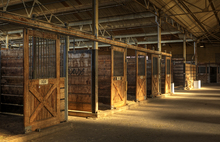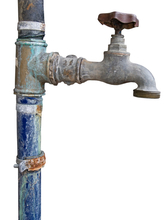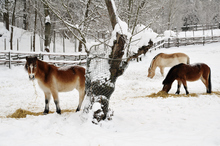Summer can be a busy time of year for horse owners. Hauling horses to competitions or clinics, operating boarding facilities, summer camps, or lesson programs or simply providing daily care for horses at an owner's private barn during the sultry summer months can be exhausting. Horse owners welcome the cooler weather and often think of fall as a time to enjoy their horses at a more leisurely pace.

Fall is the time to "winterize" your barn
Simple winter preparations will make your barn safer and more enjoyable for humans and horses alike.
While fall is a time to fully enjoy horse ownership, it is also a time to prepare for inclement weather brought by winter. Barn-keeping strategies likely remain the same for owners in regions that do not experience freezing temperatures or storms, but for horse owners living in areas with winter weather, taking the time to prepare will be worth avoiding frustration down the road.
General horse barn prep
Look for drafty areas. Check barn doors, barn windows, and other areas for large drafts. Cover holes that would allow in too much cold air. Eliminate drafty areas, but leave spaces for fresh air to circulate. Good ventilation is critical. A barn that is "too tight" prevents any airflow from circulating and can lead to respiratory ailments.

This hardware takes hard wear
Give the mechanical structure of the interior of your barn a once-over before winter sets in.
Avoid frozen barn doors. Clean out areas beneath doors. Install or replace gutters above barn doors to redirect the flow of melting snow and other precipitation. De-icing products are sometimes necessary to create safe work areas around the barn.
Keep cats and dogs away from treated areas. De-icing materials should not be ingested and can irritate padded paws.
Inspect light bulbs and electrical systems. Shorter days begin long before the cold weather sets in. Replace blown light bulbs and hire an electrician to make any necessary repairs to damaged wiring. A well-lit barn is easier to work in and is safer for horses, horse owners, and visitors.
Store battery-powered flashlights or lanterns in easily accessible locations. When winter storms interrupt the power supply, finding the way around a dark barn is challenging.
If the flashlight or lantern was used last year, check the batteries to be sure the light is ready to use.
Bed stalls deeper than normal. Additional bedding material insulates floors, keeping the floors and overall temperature of the barn warmer.
Maintaining a water supply for your horses
Insulate water hydrants and exposed pipes. Insulating tape can be purchased at most local hardware stores and is an inexpensive way to avoid frozen water supplies. Tank heaters for outdoor water troughs are also available at local farm supply stores. Purchase a heater designed for livestock tanks. Some heaters are only designed to bring water to a boil.

Protect your horse barn pipes
How many of us have experienced broken pipes in the winter. Simple preparations save you time and money.
Use a unit specifically made for the size and shape of the tank in the pasture. An improperly fitting heater rests against tank walls and could melt a hole through the side or bottom of the tank. Check the water level daily to ensure the heater is submerged and working properly.
Basketballs or soccer balls left floating on the water's surface can be enough to keep water from freezing in regions that do not experience hard freezes.
Consider investing in a generator. In the event of a power outage, barns relying on wells will not have water. Depending on the distance between the barn and the next available water supply it could be too far to transport water daily.
Know how to turn off the water supply to the barn. In the event that a pipe bursts, it is important to know how to shut off the main flow of water to avoid flooding.
Be proactive on feed supply
Plan ahead. Stock up on feed and supplements. When inclement weather sets in, a trip to the feed store or hay supplier could be treacherous.

Keep your horse's pantry full
Dangerous storms and icy roads can be avoided by filling your horse's hay barn when the weather is good.
Horse owners in regions that experience regular storms may want to keep a two, three, or even four week supply on hand. Listen to weather forecasts regularly for alerts about upcoming storms. If severe weather is predicted, purchase needed supplies before the weather arrives.
Prepare for rodents and pests. Rodents seek shelter from harsh weather conditions. Grain, hay, and horse supplements attract pests, especially in the winter. Purchase rodent-proof storage containers for feed and supplements and consider a pest control plan. Bait and traps should be used carefully, especially when cats also live in the barn.
Plan ahead to keep your equines comfortable
Taking the time to plan ahead before the winter weather arrives will save horse owners time and frustration. It is also important to remember that horse owners often think a horse is cold just because they themselves are cold. Horses that grow a winter coat have natural protection from the elements.

Most horses enjoy and thrive during cooler weather
Crisp winter mornings can be beautiful and a great time to enjoy that natural wonder of the horse.
Wind and wet weather can penetrate a horse's thick coat, so a run-in or shelter is helpful. If the horse is blanketed, a clean, dry spare blanket should be on-hand to replace a wet, dirty, or damaged one. A good rule of thumb is that if a horse's ears are cold, the horse is cold.
Dig deeperTM
EquiMed wants you to have a safe and healthy barn. For more ideas on this topic, visit Health Barn Health Center.
